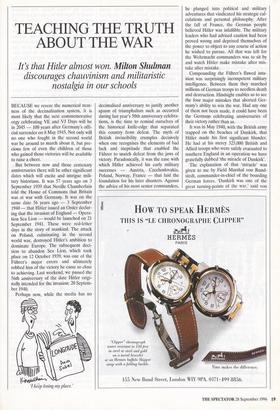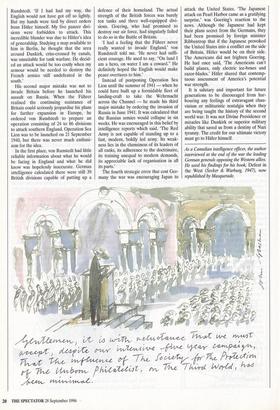TEACHING THE TRUTH ABOUT THE WAR
It's that Hitler almost won. Milton Shulman discourages chauvinism and militaristic nostalgia in our schools
BECAUSE we revere the numerical neat- ness of the decimalisation system, it is most likely that the next commemorative orgy celebrating VE and VJ Days will be in 2045 — 100 years after Germany's offi- cial surrender on 8 May 1945. Not only will no one who fought in the second world war be around to march about it, but pre- cious few of even the children of those who gained those victories will be available to raise a cheer.
But between now and those centenary anniversaries there will be other significant dates which will excite and intrigue mili- tary historians. It was 57 years ago on 3 September 1939 that Neville Chamberlain told the House of Commons that Britain was at war with Germany. It was on the same date 56 years ago — 3 September 1940 — that Hitler issued an Order declar- ing that the invasion of England — Opera- tion Sea Lion — would be launched on 21 September 1941. These were red-letter days in the story of mankind. The attack on Poland, culminating in the second world war, destroyed Hitler's ambition to dominate Europe. The subsequent deci- sion to abandon Sea Lion, which took place on 12 October 1939, was one of the Fiihrer's major errors and ultimately robbed him of the victory he came so close to achieving. Last weekend, we passed the 56th anniversary of the date Hitler origi- nally intended for the invasion: 20 Septem- ber 1940.
Perhaps now, while the media has no keep losing my place.' decimalised anniversary to justify another spasm of triumphalism such as occurred during last year's 50th anniversary celebra- tions, is the time to remind ourselves of the historical knife-edge that separated this country from defeat. The myth of British invincibility crumples decisively when one recognises the elements of bad luck and ineptitude that enabled the Fiihrer to snatch defeat from the jaws of victory. Paradoxically, it was the ease with which Hitler achieved his early military successes — Austria, Czechoslovakia, Poland, Norway, France — that laid the foundation for his later disasters. Against the advice of his most senior commanders, he plunged into political and military adventures that vindicated his strategic cal- culations and personal philosophy. After the fall of France, the German people believed Hitler was infallible. The military leaders who had advised caution had been proved wrong and deprived themselves of the power to object to any course of action he wished to pursue. All that was left for the Wehrmacht commanders was to sit by and watch Hitler make mistake after mis- take after mistake.
Compounding the Fiihrer's flawed intu- ition was surprisingly incompetent military intelligence. Between them they marched millions of German troops to needless death and destruction. Hindsight enables us to see the four major mistakes that aborted Ger- many's ability to win the war. Had any one of them not been made, it could have been the Germans celebrating anniversaries of their victory rather than us.
It was in May 1940, with the British army trapped on the beaches of Dunkirk, that Hitler made his first significant blunder. He had at his mercy 325,000 British and Allied troops who were safely evacuated to southern England in an operation we have gratefully dubbed 'the miracle of Dunkirk'. The explanation of that 'miracle' was given to me by Field Marshal von Rund- stedt, commander-in-chief of the boarding German forces. 'Dunkirk was one of the great turning-points of the war,' said von Rundstedt. 'If I had had my way, the English would not have got off so lightly. But my hands were tied by direct orders from Hitler himself. My five panzer divi- sions were forbidden to attack. This incredible blunder was due to Hitler's idea of generalship. Studying a map available to him in Berlin, he thought that the area around Dunkirk, criss-crossed by canals, was unsuitable for tank warfare. He decid- ed an attack would be too costly when my armour would be needed to destroy the French armies still undefeated in the south.'
His second major mistake was not to invade Britain before he launched his assault on Russia. When the Fithrer realised the continuing resistance of Britain could seriously jeopardise his plans for further expansion in Europe, he ordered von Rundstedt to prepare an operation consisting of 24 to 86 divisions to attack southern England. Operation Sea Lion was to be launched on 21 September 1940, but there was never much enthusi- asm for the idea.
In the first place, von Runstedt had little reliable information about what he would be facing in England and what he did know was hopelessly inaccurate. German intelligence calculated there were still 39 British divisions capable of putting up a defence of their homeland. The actual strength of the British forces was barely ten tanks and three well-equipped divi- sions. Goering, who had promised to destroy our air force, had singularly failed to do so in the Battle of Britain.
'I had a feeling that the Fiihrer never really wanted to invade England,' von Rundstedt told me. 'He never had suffi- cient courage. He used to say, "On land I am a hero, on water I am a coward." He definitely hoped the English would make peace overtures to him.'
Instead of postponing Operation Sea Lion until the summer of 1941 — when he could have built up a formidable fleet of landing-craft to take the Wehrmacht across the Channel — he made his third major mistake by ordering the invasion of Russia in June 1941. It was calculated that the Russian armies would collapse in six weeks. He was encouraged in this belief by intelligence reports which said, 'The Red Army is not capable of standing up to a fast, modern, boldly led army. Its weak- ness lies in the clumsiness of its leaders of all ranks, its adherence to the doctrinaire, its training unequal to modem demands, its appreciable lack of organisation in all its parts.'
The fourth strategic error that cost Ger- many the war was encouraging Japan to attack the United States. 'The Japanese attack on Pearl Harbor came as a gratifying surprise,' was Goering's reaction to the news. Although the Japanese had kept their plans secret from the Germans, they had been promised by foreign minister Ribbentrop that if the Japanese provoked the United States into a conflict on the side of Britain, Hitler would be on their side. The Americans did not frighten Goering. He had once said, 'The Americans can't build planes, only electric ice-boxes and razor-blades.' Hitler shared that contemp- tuous assessment of America's potential war strength.
It is salutary and important for future generations to be discouraged from har- bouring any feelings of extravagant chau- vinism or militaristic nostalgia when they are being taught the history of the second world war. It was not Divine Providence or miracles like Dunkirk or superior military ability that saved us from a destiny of Nazi tyranny. The credit for our ultimate victory must go to Hitler himself.
As a Canadian intelligence officer, the author interviewed at the end of the war the leading German generals opposing the Western allies. He used his findings for his book, Defeat in the West (Seeker & Warburg, 1947), now republished by Masquerade.



















































































 Previous page
Previous page